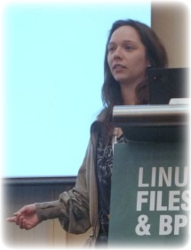Kernel (Linux) Leftovers
-
LWN ☛ Filesystem testing for stable kernels
Leah Rumancik led a filesystem-track session at the 2024 Linux Storage, Filesystem, Memory Management, and BPF Summit on the testing needed to qualify XFS patches for the stable kernels. At last year's summit, Rumancik, Amir Goldstein, and Chandan Babu Rajendra presented on their efforts to test and backport fixes for the XFS filesystem to three separate stable kernels. There has been some longstanding unhappiness in the XFS-development community with the stable-kernel process, which led to backports ceasing for that filesystem until Goldstein started working on XFS testing for the stable trees a few years ago. In this year's session, Rumancik updated attendees on how things had gone over the last year and wanted to discuss some remaining pain points for the process.
-
Collabora ☛ A journey towards reliable testing in the Linux Kernel
We're reflecting on the steps taken as we continually seek to improve Linux kernel integration. This will include more detail about the tests used to enhance the quality of testing processes and coverage.
-
Linux Kernel 6.10 Released: Discover the Latest Security Features Enhancing System Protection
The Linux Kernel 6.10 has been officially released, introducing a range of new security features aimed at enhancing system protection and performance.
-
LWN ☛ A deprecation timeline for older Arm CPUs
Arnd Bergmann has posted a
detailed timeline for the deprecation of support for old Arm CPUs in
both the kernel and the compiler toolchain. Anybody who is working with
that hardware will likely want to review this list and let the relevant
developers know if any of that support is still needed.
-
Free Desktop ☛ [ANNOUNCE] mesa 24.2.0-rc3
Hello everyone,
I'm happy to announce the next release candidate, 24.2.0-rc3.
As always, if you find any issues please report them here: https://gitlab.freedesktop.org/mesa/mesa/-/issues/new
Any issue that should block the release of 24.2.0 final, thus adding more 24.2.0-rc* release candidates, must be added to this milestone: https://gitlab.freedesktop.org/mesa/mesa/-/milestones/47
The next release candidate is expected in one week, on August 7th.
Cheers, Eric -
Linux Foundation's Site/Blog ☛ Xen Project Announces Performance and Security Advancements with Release of 4.19
The Xen Project, an open source project under the Linux Foundation, is proud to announce the release of Xen Project 4.19. This release marks a significant milestone in enhancing performance, security, and versatility across various architectures, including Arm, PPC, RISC-V, and x86, altogether providing a robust and secure hypervisor solution for both enterprises and cloud providers.
-
LWN ☛ A look inside the BPF verifier
LWN has covered BPF since its initial introduction to Linux, usually through the lens of the newest developments; this can make it hard to view the whole picture. BPF provides a way to extend a running kernel, without having to recompile and reboot. It does this in a safe way, so that malicious BPF programs cannot crash a running kernel, thanks to the BPF verifier. So how does the verifier actually work, what are its limits, and how has it changed since the early days of BPF?
-
LWN ☛ The first half of the 6.11 merge window
The merge window for the 6.11 kernel release opened on July 14; as of this writing, 4,072 non-merge changesets have been pulled into the mainline repository since then. This merge window, in other words, is just now beginning. Still, there has been enough time for a number of interesting changes to land for the next kernel release; read on for a summary of what has been merged so far.
-
LWN ☛ Large folios, swap, and FS-Cache
David Howells wanted to discuss swap handling in light of multi-page folios in a combined storage, filesystem, and memory-management session at the 2024 Linux Storage, Filesystem, Memory Management, and BPF Summit. Swapping has always been done with a one-to-one mapping of memory pages to swap slots, he said, but swapping multi-page folios breaks that assumption. He wondered if it would make sense to use filesystem techniques to track swapped-out folios.
Traditional swap is divided into page-sized segments, Howells began, and, up until recently, memory was divided the same way. When the kernel wanted to swap something out, it found a free segment and put the contents of the page there; the reverse of that was done when it needed to swap the page back in. But, with folios, there might be two pages, 2MB of pages, or even 2GB of pages joined together that need to be swapped out as a unit.

